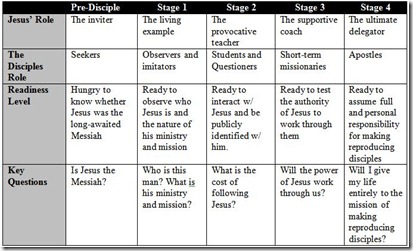We often think about discipleship being only for believers, but what about discipleship and the unbeliever?
Is there such a thing as discipleship for the unbeliever? Can unbelievers be discipled?

To hear some Christians and pastors talk about it, discipleship begins the moment a person believes in Jesus for eternal life. One of the first steps of discipleship, we are often taught, is baptism, and disciples of Jesus should also get involved in a community of believers, tithe, pray, and attend a Bible study. These sorts of things are what often characterizes a true disciple of Jesus Christ. Since most unbelievers do not do such things, it makes no sense to talk about discipleship and the unbeliever.
I want to challenge that idea. I believe unbelievers can be discipled and should be discipled. Though most of discipleship is for believers, there are also numerous aspects of discipleship for the unbeliever.
Reconsidering Discipleship and the Unbeliever
If current followers of Jesus sought to engage in more methods of discipleship with the unbeliever, I think we would see more people believe in Jesus for eternal life, and thus, more people become fully devoted followers of Jesus. But when we say, “Our first task to to convert people, and after that, the process of discipleship begins,” we neglect a vital and critical element of the evangelistic process.
Here are three reasons why we should practice discipleship with unbelievers.
The Definition of “Discipleship” and the “Unbeliever”
When it comes to the issue of discipleship and the unbeliever (and almost any other issue of theology as well), it is essential to define the key terms. In this case, what is meant by “discipleship” and the “unbeliever”?
Discipleship is the process or act of learning to become like someone else. It is roughly equivalent to the terms “student, learner, or follower,” though my favorite synonym is “apprentice.” When we think of discipleship as only being a student or learner, we usually think of sitting in a classroom or auditorium and listening to someone lecture at us while we listen attentively and take notes.
The idea of “apprentice” however, includes not just learning about something, but also doing or practicing what is learned. Discipleship is following someone around to learn from them, observe them, so that the learner can ultimately do the same things as the teacher. The disciple, when fully trained, is just like the teacher. The word “apprentice” carries this idea best.
Notice, of course, that apprenticeship can begin before a person really knows anything about the trade or craft they are trying to learn. Someone can even be an apprentice even if they are not certain they want to practice that trade or craft for their entire life. Some people become an apprentice as a way of testing the waters.
So when it comes to discipleship and the unbeliever, it seems logical that an unbeliever could seek to learn from Jesus and become more like Jesus in his or her life, before they ever make the commitment to follow Him completely, and definitely before they come to believe in Jesus for eternal life. Discipleship can be a way for an unbeliever to try to figure out who Jesus is, what He teaches, and what it means to follow Him.
This becomes even more true when we seek to define the term “unbeliever.”
The term basically means “someone who doesn’t believe.” Based on this definition, no one is technically an “unbeliever” for everybody believes something. When speaking about “unbelievers” we need to ask “Unbeliever about what?”
Yet even when it comes to issues related to God, Jesus, sin, the Bible, and a whole host of other Christian teachings, there is nobody is a true “unbeliever.” Even someone who is an atheist is likely to believe that there was a man named Jesus who lived 2000 years ago who died on a cross at the hands of the Romans.
Obviously then, he term “unbeliever” is relative. Everybody believes something.

So again, when we talk about discipleship and the unbeliever, we can see that no matter what a person believes or doesn’t believe about God, Jesus, sin, Scripture, and a whole host of other Christian teachings, there is always room for us to talk with a person about what they believe (or don’t believe) and hopefully bring them to a place that is somewhat closer to the truth revealed through Jesus Christ and in the Scriptures.
And if we help someone to believe a truth about Jesus (or God, Scripture, etc) that they didn’t believe before, does this not cause them to learn about Jesus and follow Him a little closer than before? Is this not a form of discipleship? Of course it is!
In some sense, it could be argued that everyone is following Jesus.
But the fact that we can engage in discipleship with the unbeliever is also seen in the very life and ministry of Jesus Himself.
Jesus Engaged in Discipleship with Unbelievers
Jesus is the best example of how to perform discipleship, and it is fairly obvious from a quick reading of the Gospels that Jesus engaged in discipleship with unbelievers.
Don’t believe me?

Tell me, was Judas a disciple of Jesus? Of course he was! He is frequently referred to in the Gospels as a disciple, and specifically, one of the Twelve.
Then there are all the multitudes of people who followed Jesus around to listen to His teachings and receive His healing and observe His miracles. John 6:60-66 (and other texts) reveals pretty plainly that many of these people who followed Jesus — who are called “disciples” — did not believe in Jesus, that is, they were not “believers.” They were disciples and unbelievers.
This alone should show us that it is not impossible to talk about discipleship and the unbeliever. Jesus discipled unbelievers, and let them follow Him, and taught them, and trained them, and called them to an ever-increasing faith and obedience to Him and His way. Some turned away and stopped following, while others continued to follow Him.
Even then, none of His disciples fully believed everything Jesus said. Judas, of course, we have already talked about, but prior to the death and resurrection of Jesus, not even Peter, James, and John believed that Jesus would die and rise from the dead. So in a sense, when it came to the death and resurrection, all of the disciples were “unbelievers.” (See my message on the Six Denials of Peter.)
Discipleship is a Process
All this points to the fact that when it comes to discipleship and the unbeliever, there really is not “beginning” point of discipleship, just as there is no end point either.
No honest disciple of Jesus ever thinks they have “arrived” and have become a perfect and fully-devoted follower of Jesus Christ. Discipleship is always a process. It never ends.
It also seems that discipleship never really begins either. The only real “beginning” of discipleship is the moment of physical birth. At that point, the Spirit of God begins to draw us, pull us, and woo us toward Jesus. Our parents, whether they were “Christians” or not, begin to teach us things about God and this world (even if they weren’t around and even if they taught us horrible things, they still teach us). This too is an aspect of discipleship.
As we grow, we adopt a worldview about the universe, humankind, what is important in life, and what happens after death. All of this is an aspect of discipleship.
It’s not a matter of who is in and who is out, but is an issue of proximity to Jesus. Someone is a disciple of Jesus if they are being drawn closer to Him daily.
One book I read a while back which presents this idea well is The Critical Journey by Janet Hagberg and Robert Guelich. They somewhat argue that the journey of faith doesn’t really begin until a person recognizes the existence of God, but even then, this point of faith is long before a person actually believes in Jesus for eternal life and becomes what we might call a “Christian.”
Another book I have read on this is Transforming Discipleship by Greg Ogden. Here is a chart that comes from his book which shows the connection between discipleship and the unbeliever.

You can see that he refers to people who haven’t believed as a “Pre-Disciple” but the point is fairly clear that to get a “Pre-Disciple” to become a disciple, you need to engage in discipleship. In his chart, you want a Pre-Disciple to believe that Jesus is the Messiah. How would you get a person to believe that? Through discipleship!
Why does it matter?
If you have hung here, you might be wondering, “Why does it matter?”
Here’s why:
People make discipleship way too difficult. Discipleship is often thought of as this magical and mysterious process by which a new believer gets transformed into this miracle-working Saint.
But there is nothing magical or mysterious about discipleship. There are no secret steps or secret handshakes. You learn to follow Jesus the same way you learn everything else: you spend time doing it.
And as long as we put up this artificial barrier between “believers” and “unbelievers” we end up focusing most of our time and effort on believers. We hold Bible studies for them. We do training sessions for them. We have get-togethers for them.
But as soon as we dump the barriers to discipleship (“Oh, you can’t come to this group until you become a believer”), then everyone is welcome at any time. As soon as we realize that discipleship is not just for believers, but is for everyone, then we can begin to realize that discipleship is not program or a church activity, but is a way of life.
We are always learning and always teaching. We are engaged in discipleship with unbelievers when we talk to friends at lunch. When we interact with our neighbor over the fence. When we behave with honesty and integrity at work. All of this is discipleship, both for us and for those with us.
In the end, I believe that pondering the issue of discipleship and the unbeliever actually enables us to understand discipleship better, and helps us live as better disciples of Jesus Christ.
What are you thoughts about discipleship and the unbeliever?




I once did a church plant that was something of an experiment to see what would happen if we let go of traditional lines of church thought and practice. We determined to allow lost people to be lost WHILE attending our church. Two examples I think back on often:
1) An atheist in her 60’s became a regular attender at our worship services for about 6 months – then came Easter. This woman came out of the West Coast theater scene and was a costume maker. I thought, “why not ask her to make the costumes for our children’s Easter drama?” Some in the church family asked, “are you really going to allow an atheist to make the Easter costumes?” My answer was, “Absolutely, there is nothing particularly religious or irreligious about making costumes.”
She made the costumes and the church was blown away by the creativeness and quality of work by this woman. The next Sunday following Easter, she walked up to me and asked, “would it be possible for me to be baptized?” I said, “I thought you did not believe in God.” She replied, “I didn’t until you allowed me, an atheist, to make your Easter costumes. I was thinking about how the church has loved and accepted when the love and reality of Christ flooded my life.”
2) A Buddhist attended our services for a year. We became friends, but I never invaded his Buddhist world with Christian persuasion tactics. One Friday night near midnight, I was in the office doing some things when a knock came at the door. It was him stopping by to tell me he just had an encounter with Christ that was life changing.
Now I am back in a traditional church and these things are no longer possible. Oh how I miss it – but worse, how many unbelievers are missing it?
Mitch, Why not allow this to happen again? Sounds to me that you were on target then shied away from it just because you went back to the ‘religious’ sector.
The long and short of it is there must be a welcoming atmosphere. Unbelievers who attend the church fellowship must be accepted and treated as “people”, not treated as “lost” people. The first thing people do around here is try to get them into the various programs of the church or pressure them into a Bible study group, or make it their mission to get the unbeliever saved.
Me – I love to hang out with lost people and I love for them to hang out with us. Our people will not just allow them to hang out. A retired pastor who attends our church became loud and agitated with me in an informal small group meeting. He said, “if we do not tell them about Jesus and get them saved tonight, when will they ever get saved? WHEN?”
My response, “I don’t know when, but it probably will not be tonight in this church.”
I believe we need to give the Holy Spirit the opportunity to rub some grace in….. If we are shoving the gospel down someone’s throat, it is not the work of the Holy Spirit, nor is it grace. Using fear tactics such as “if you died tonight, would you go to heaven” is the opposite of faith in Christ – it is the fear of death. Subsequently, salvation becomes an escape from the fear of death.
Too many people are running around, wiping their brow and saying, “whew, I escaped death.” The gospel is not just about a life of coming out of…….. It is a life of entering into………….
In my previous church where unbelievers would attend for up to a year before becoming a believer, those new believers would often be far more advanced in their walk with Christ than many of those who had been believers for years.
I am no longer interested in priming people up or whatever we prefer to call it – to make a “decision” to follow Christ I am interested in people “following” Christ.
Mitch, I’m one of the lost. I’m currently seeking God and trying to figure out what that means and what that looks like. I know this is a super old comment, and what you said really spoke to me.
I was part of a church like the one you describe as well. It was in Arlington, TX. It was wonderful and amazing. We might still be there, except we moved. Such groups of believers are so rare. Most groups require some sort of conformity of belief and behavior before you will be accepted in.
This is one of the most fascinating pieces I’ve read on Christianity in some time, especially your line about discipleship being proximity to Jesus. My wife and I became Christians through reading the Bible and an “experience” of what I can only describe as the best feeling we’ve ever had. We both felt a presence, love, and comfort, far different than anything we’d ever previously experienced in life. It was real and tangible, not just knowledge; we had no doubt that we’d encountered “something”. Then we went to church because we thought that’s what we should do and it all went downhill fast. That feeling has never returned.
Today, we’re barely Christians. I consider walking away almost daily. I live in a pretty rural area with only few churches around, many of which have gone reformed. I hate so much of Christianity… and don’t know what it even means to be a Christian anymore. What keeps me is that I think, on the surface level anyways, Christianity is still the most reasonable worldview.
I like what you say here but it seems so subjective. Funny, how subjectivity would trip me up now since I was converted through an entirely subjective experience, yet, it does indeed trip me up. WIth so many different people claiming differing things about what it means to follow Jesus, and all using the Bible to “prove” it, how can we possibly know with certainty what it means to actually follow Jesus? Who’s right?
Hi Buster, Sounds like you had encountered God via His Word and possibly The Holy Spirit, then attempted to become part of The Body at an institutional church. Sounds to me that your struggle is probably with churchianity and not so much Christianity. My guess is that you have not truly experienced biblical community and opportunity to do so in rural areas is very difficult. To gain a better perspective of what and why institutional church has not only let you down, but is not biblical, I suggest you read a book called Pagan Christianity, by Frank Viola and George Barna, and the follow-up books as well. Here is a link to a web site I find very encouraging in my daily walk. The daily devotionals and free on line books are a blessing to me as I wander in the wilderness outside of institutional church. http://www.heavensfamily.org/ss/
Thanks, Chris. I’m familiar with Viola and Barna. It’s not the way “institutional” church is done that I necessarily disagree with, it’s the ideas and beliefs which often exist within those churches, all of which ultimately find their basis in the Bible.
Perhaps it was the Holy Spirit I experienced, or maybe just an emotional high. When I was a kid, I used to have quite the imagination; as I grew older it was difficult letting go of some things I thought were real when I was younger. As a child, the emotional appeal and experience many of these things provided was real, the things themselves however were not.
Once we step away from objective reality and into this subjective “following” how do we know what’s real anymore? What do we measure our experience against to know whether or not we’re following God versus our imagination?
This is where I think the Bible viewed as a literal objective standard has strength.
I meant to add that for the Bible to serve as such a standard however, first one needs to be convinced that it’s actually a divine revelation, and then become clear in its content. History and the amount of different churches and disagreements within Christianity today have made it abundantly clear that even though we may “think” we’re certain about what we understand the Bible to be teaching, so do probably the majority of people who disagree with us.
I’m finding it much easier just to live in reality and not base decisions on anything more than what can be objectively validated. It leaves me with some existential anxiety and doesn’t provide answers about life after death, but it provides real certainty where it offers it and safeguards against the insanity of the mystical and the dangers of basing conclusions on things that can never be proven or tested.
If people stopped talking and writing, what we know of “divine revelation” would cease to exist. Outside of what we tell ourselves and each other, there is no indication that something divine is intervening in this world.
Buster, it does get confusing. Even though churches say they base their beliefs and teachings on the Bible, if you check out several churches you’ll probably find out that their beliefs and teachings vary. They “interpret” the Bible in a variety of ways.
My wife and I figured out that we were being taught to follow whichever church we happened to be attending at the time – their beliefs, their interpretation of Bible, theology, tradition and so on. It’s all confusing. One group might have female pastors, for example, while another group won’t even allow women to speak in church. That doesn’t even make sense to most people. Of course both groups claim they are correct, and that they base their belief on the Bible.
We decided to start with the Gospels, with Jesus. We believe he is the son of God, but even if you decide that he was just a great prophet, he is still worth looking to. He loved everyone, and had harsh words only for the religious authorities who put heavy burdens on the backs of others. He hung out with the poor, the outcast, women, lepers, tax collectors, prostitutes, rich people, and ordinary people.
We don’t trust in theologies, Bible interpretations, this church or that church. Jesus is our mentor. We don’t find him in churches, but among people, especially among the poor, the homeless, the outcast and sometimes even among the rich. This is not to say that some people cannot find him in churches. It only says that is not where we find Jesus. If you’re having trouble finding him in churches, in theologies, in Bible interpretations, then how about looking for him in the Gospels, then among the people.
Thanks for the encouragement and questions. I am in Christian ministry and hate much of Christianity as well. There is so much bad stuff mixed in with the good, it gets difficult to claim the title “Christian.”
I am not exactly trying to be subjective, but I actually think that following Jesus IS subjective. Look at this way: If I were to ask you, “What does it mean to have a good marriage?” can anybody say with certainty how this looks and how it is accomplished? No, because everyone is different and all marriages are different.
I think the same is true with following Jesus. Following Jesus is a relational thing, just like marriages, and so every person’s walk with Jesus is going to look different. Anybody who says, “Here is what it looks like, and here are the 10 steps to following Jesus” probably is trying to sell you some product or control you in some way.
Thanks Sam & Jeremy. Stuff to chew on…
That’s a valid point about relationship being subjective in general. Though, human relationships are physical, so there’s no question what each person is saying/doing.
You must attend a Biblical Church as God describes. Not just any Church.
General comment – Jesus is not an experience. This could be where your problem lies. Also why you need a teaching Church.
General to topic. This writer is wrong. Disciple means follower of Christ. Yes that’s the meaning. You don’t disciple an unbeliever. You can’t. The Holy Spirit does this.
So –
As I read this, it hits me that the Great Commission doesn’t lay out a sequence. Jesus says, “Make disciples, baptizing them and teaching them everything.” The baptizing is necessarily included, but it isn’t said to be a gateway move. We’ve simply assumed that.
Just as individuals aren’t told to start in Jerusalem. The uttermost parts of the earth are where most of us happen to be.
Thank you SO much for writing this! I was just speaking with my roommate about one of our other roommates who,has not given their life to Christ and the process of discipleship. I sent this to my other roommate who put into terms that we mentor people who don’t know Christ, and disciple people who have accepted Christ. This was exactly what was on my heart! Thanks again.
No mention of Church that I saw. No mention of what the word disciple means that I saw.
So all of this is incorrect.